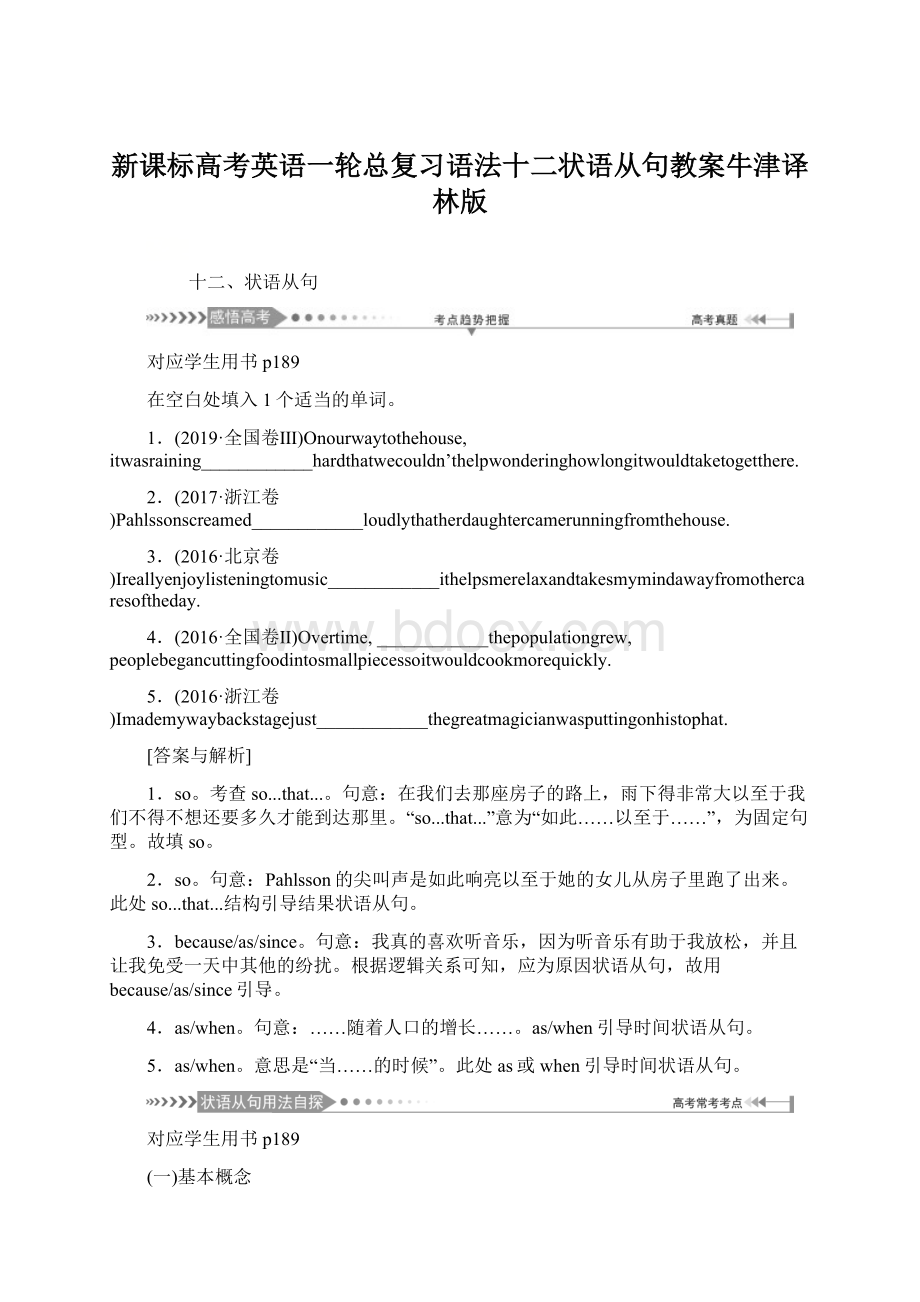新课标高考英语一轮总复习语法十二状语从句教案牛津译林版Word格式文档下载.docx
《新课标高考英语一轮总复习语法十二状语从句教案牛津译林版Word格式文档下载.docx》由会员分享,可在线阅读,更多相关《新课标高考英语一轮总复习语法十二状语从句教案牛津译林版Word格式文档下载.docx(14页珍藏版)》请在冰豆网上搜索。

在我们去那座房子的路上,雨下得非常大以至于我们不得不想还要多久才能到达那里。
“so...that...”意为“如此……以至于……”,为固定句型。
故填so。
2.so。
Pahlsson的尖叫声是如此响亮以至于她的女儿从房子里跑了出来。
此处so...that...结构引导结果状语从句。
3.because/as/since。
我真的喜欢听音乐,因为听音乐有助于我放松,并且让我免受一天中其他的纷扰。
根据逻辑关系可知,应为原因状语从句,故用because/as/since引导。
4.as/when。
……随着人口的增长……。
as/when引导时间状语从句。
5.as/when。
意思是“当……的时候”。
此处as或when引导时间状语从句。
(一)基本概念
状语从句在句中做状语,可修饰主句中的谓语或整个主句。
状语从句由从属连词引导。
状语从句可放在句首或句末,放在句首时通常要用逗号与主句隔开,放在句末时一般不用逗号。
状语从句根据它们的含义分为时间、地点、原因、目的、结果、方式、让步、条件和比较等九种。
(二)状语从句连词一览表
类 别
连 词
时间
when(当……时) whenever(每当……) as(当……时) since(自从……到现在)
till(直到)until(直到)before(在……之前)after(在……以后)
assoonas(一……就)once(一旦)themoment(一……就)thefirsttime(第一次)
theday(在……那天)nosooner...than(刚……就)hardly/barely...when/before(刚……就)
theminute(一……就)thesecond(一……就)everytime(每次)eachtime(每次)
directly(一……就)immediately/instantly(一……就)
地点
where(在……地方),wherever(任何地方,无论哪里)
条件
if(如果) unless(除非,如果不) providing/providedthat(假如) as(so)longas(只要)
onconditionthat(条件是) suppose/supposing(that)(假如)assume/assumingthat(假如)
incase(万一)onlyif(只要)
原因
because(因为) since(既然) as(因为) nowthat(既然)
seeing(that)(既然)considering(that)(考虑到)inthat(原因是)
让步
though(尽管,虽然) although(尽管,虽然) evenif/though(即使) as(尽管)
while(虽然,尽管)whatever(无论什么)wherever(无论哪里)whoever(无论谁)
however(无论怎样)nomatter+wh�词...(不论)whether...or(不管……还是)
比较
as...as(像……一样),than(比……)
方式
as(像……,犹如……),asif/though(好像,仿佛),theway(……的方式)
目的
sothat(为了,以便),inorderthat(为了),forfearthat(以防,唯恐)
结果
sothat(因此),so...that(如此……以至于),such...that(如此……以至于)
(三)常见从属连词在各种状语从句中的用法
1.时间状语从句
连 词
例 句
解 说
while
Don'
ttalksoloudwhileyourmotherishavingarest.
WhileJimwasreading,Jackwaswriting.
“在……期间”表示延续性动作或状态,可译为“一边……一边……”
JanewasdressedinwhitewhileMaryinblack.
特殊用法,“而”表对比(这种用法常被看作并列连词)
WhileIadmithisgoodpointsIcanseehisbad.
特殊用法,“尽管”(此用法也被视为表让步)
when
Itwasrainingwhenwearrived.
“当……时”表示时间的一点
Heenteredtheroomwhenthemeetingwasgoingon.
“在……期间”表延续性动作或状态
Wewereabouttosetoffonourwaywhenitsuddenlybegantorain.
“在这时,在那时”常与beabouttodo/beonthepointofdoing连用(此用法亦可视作并列连词)
as
Astimewenton,histheoryprovedtobecorrect.
Asshewasreadingtheletter,shewassheddingtears.
“一边……一边”表示主句和从句的动作同时发生,可译为“随着”
Ashefinishedthespeech,theaudienceburstintoapplause.
“当……时”表示时间点
whenever
Comewheneveryoulike.
“无论何时”表示任何不具体时间
before
ItwillbehalfayearbeforeIcomeback.
“要过……才……”
after
Hearrivedafterthegamestarted.
“在……之后”
since
HehaslivedinthecitysinceIcamehere.
“自从……到现在”
until/till
Shedidn'
tentertheroomuntilIcameback.
Shestoodthereuntil/tillIleft.
“直到”,肯定句只限用延续性动词;
短暂性动词只用于“not...until...(直到……才……)”句型。
till一般不置于句首
2.原因状语从句
because
Becausehedidn'
tobeytherules,hewaspunished.
表直接原因或理由,回答why提问必须用because
for
Itmustbemorningnow,forthebirdsaresinging.
表示从前句内容推断出的理由,不用于句首。
(此用法也被认为是并列句)
Ididn'
tgotoseehim,foraheavysnowwasfalling.
表示原因,此处相当于because
Sinceeverybodyishere,let'
sbeginourdiscussion.
“既然”,表已知的显然的理由
Asitisraining,weshallnotgotothezoo.
“因为”,表示对主句的附带说明
now(that)
Nowthatyouareoldenough,beindependent.
“既然”,相当于since
3.地点状语从句
where
Corngrowsbestwherethegroundisrich.
Wherethereiswater,thereislife.
“在……的地方”“哪里”
wherever
Hewillworkwhereverthepeopleneedhim.
Whereverhemaygo,hewillbehappy.
“无论哪里”“不管什么地方”
4.条件状语从句
if
IfyoudothatIshallbeverypleased.
“如果”
unless
Ishallgotomorrowunlessitrains.
“除非,如果不”相当于ifnot
incase
Ishalltakeanumbrellawithmeincaseitrains.
“以防;
万一”
as(so)longas
Youmayusetheroomasyoulike,aslongasyoucleanitupafterwards.
“只要”
onconditionthat
Iwilllendyouthemoneyonconditionthatyoupayitbackinonemonth.
“在……的条件下”“只要”
5.方式状语从句
Yououghttowriteashedoes.
Theywatchhercloselyasacatwatchesarat.
“像……一样”
asif(though)
Irememberthewholething,asifithappenedyesterday.
HetreatsmeasifIwereastranger.
“好像,仿佛”从句可用陈述语气,也可用虚拟语气
6.比较状语从句
as...as...
HeisastallasI.
“和/像……一样”前一个as是副词,修饰形容词和副词。
第二个as是连词,连接状语从句
notso(as)...as...
Hedoesnotsmokeso/asheavilyashisbrother.
“不如……”,用于否定句
than
HeistallerthanI.
Herpronunciationisbetterthanmine.
IlikevisitingfriendsbetterthanwatchingTVathome.
Itischeapertogobycarthanbytrain.
比较从句通常是一种省略形式。
省略与主句相同的部分,以突出相比较的部分;
使句子更简练。
常体现在同类的主语与主语比,同类的宾语与宾语